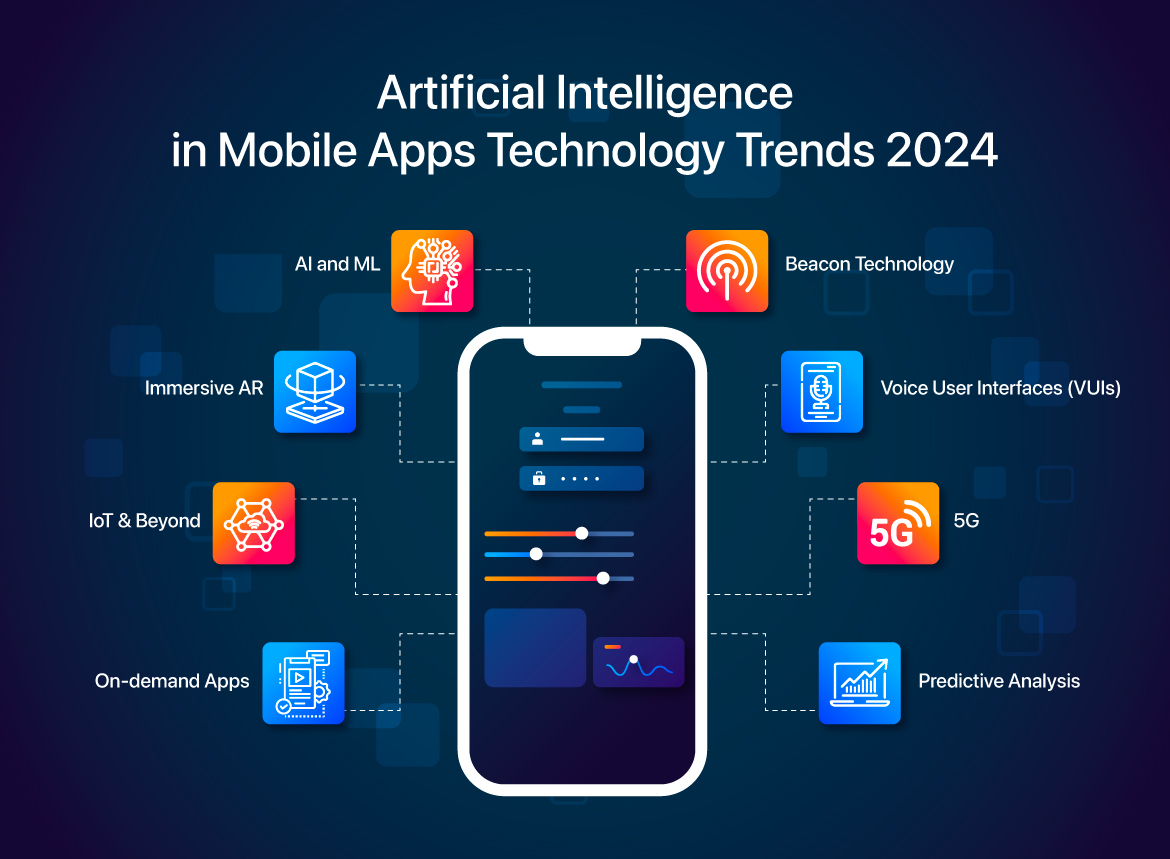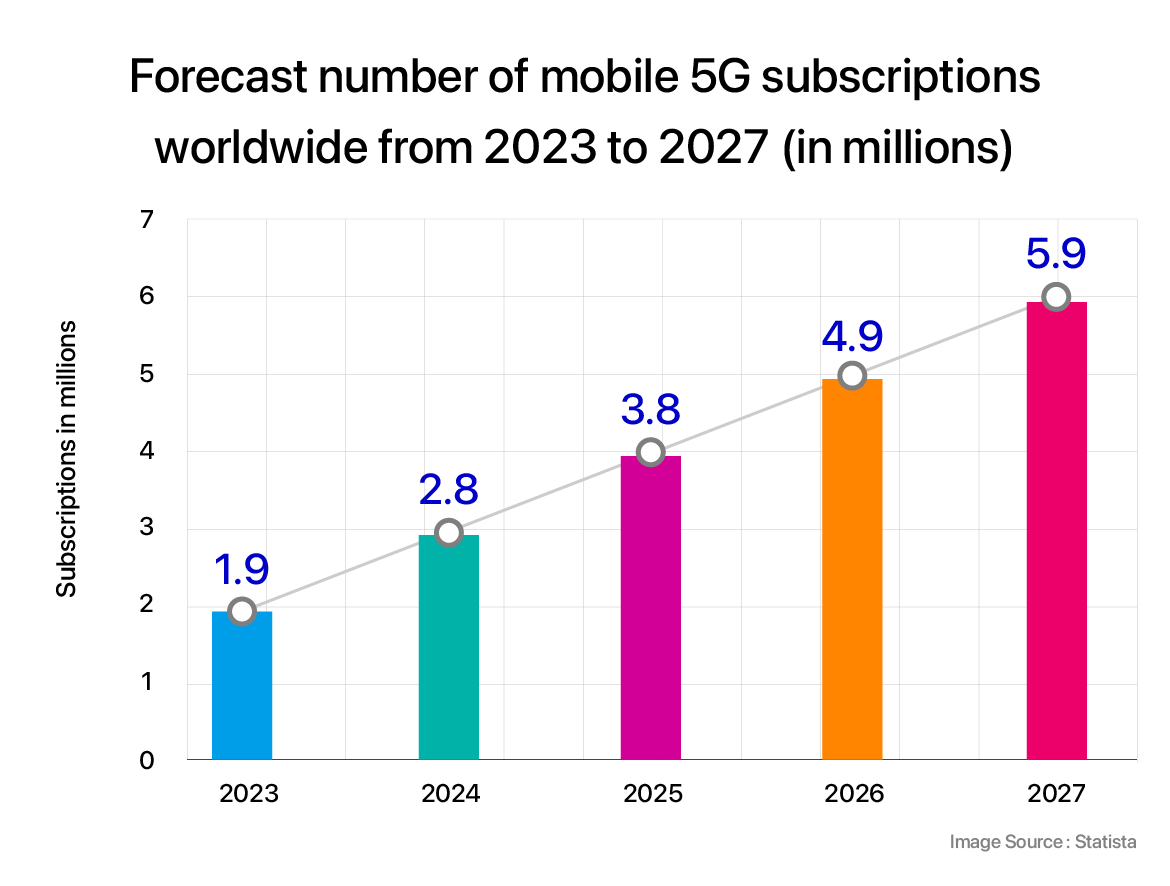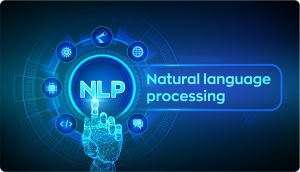
Integrating apps with artificial intelligence is like endowing the app with a compass, navigating users through a personalized journey. It’s not merely technology; it’s steering users toward smarter and more intuitive destinations.
AI-driven functionalities like voice assistants, personalized recommendations, and predictive analytics are now commonplace in mobile applications and software. However, as artificial intelligence garners an increased adoption, its potential applications are expanding across various industry sectors.
While AI in mobile applications is widely used in finance, digital spaces encompassing social media, e-commerce, and e-marketing, it is also making significant strides in our everyday work processes. In fact, there is no industry that has not felt the impact of AI.
Why has AI Integration in Apps increased in recent years?
The AI market is expected to hit $407 billion by 2027, marking a significant increase from its 2022 revenue of $86.9 billion (Forbes Advisor).
In the past, the barrier to entry of integrating artificial integration in mobile apps was high. This was because of the high computational requirements and associated costs for training AI models, along with a shortage of skilled AI professionals. The uncertain returns on investment also added to the hesitancy.
However, in recent years, significant changes have occurred to lower these barriers.
- The emergence of user-friendly AI development toolsand platforms, such as TensorFlow and PyTorch, and frameworks like Google’s AutoML have made it more accessible for developers to develop functionality driven by AI technologies like ML and NLP (Natural Language Processing).
- Cloud-based AI services, offered by major providers like AWS, Azure, and Google Cloud, allow businesses to access powerful computing resources without the need for significant upfront investments.
- Moreover, there has been a growth in the availability of pre-trained models and APIs, simplifying the integration process. Some examples are GPT-3.5-turbo for remarkably human-like interactions or Whisper v2-large used for multilingual translation.
- The smartphones we have today are powerful devices compared to the older devices which were constrained by their processing and storage capabilities.
As the AI talent pool expands, more businesses can now tap into skilled professionals to guide them through the complexities. Overall, these changes have democratized access to AI, making it more feasible for a broader range of businesses to integrate AI into their applications.

How Apps with Artificial Intelligence are Reshaping Businesses and User Experience
With smartphones evolving and packing advanced Systems on Chips (SoCs) that boast specialized Neural Processing Units (NPUs), and along with 5G connectivity, the stage is set for a transformative era in mobile technology.

Here are some AI application use cases spanning a few industries that showcase how artificial intelligence is revolutionizing and optimizing processes, driving innovation, and transforming the way we live and work.
AI Productivity Apps that Supercharge Our Work Life
A recent Microsoft study surveyed 2,700 employees and 1,800 business decision-makers in the US, UK, and Japan. 85% said they would like additional AI tools to automate daily tasks, allowing more time for intellectually demanding work.
There are many popular AI-powered apps like Grammarly and ChatGPT that use large language models and are extensively used in business communications. However, there are others that are lesser known yet making an impact. Otter Voice Notes is a prime example. Otter utilizes AI for real-time audio transcription during meetings, streamlining note-taking, and will even capture slides and share a summary of the proceeding after the meeting is over. These notes are sharable, searchable, and secure. When connected with your meeting calendar it will fire off automatically. This leaves participants free to focus fully on the business interaction.
Another example of an AI-powered app is Missive, an email management and chat platform, that has recently integrated an AI feature through OpenAI’s ChatGPT. This can generate email responses swiftly based on user instructions. For instance, users can ask Missive to draft a sales mail for a product or service offered and it provides a response within seconds.
AI in Financial Apps
In the financial domain, AI is reshaping investment strategies through robo-advisors like Betterment, which use algorithms to analyze user profiles and provide personalized investment recommendations. Fraud detection is fortified by AI-powered apps like Feedzai, which scrutinize transactions and patterns to identify and prevent fraudulent activities. In insurance, Lemonade utilizes AI for streamlined policy underwriting, leveraging machine learning models to assess risks based on diverse data inputs. Additionally, Geico’s virtual assistant, Kate, employs natural language processing to assist customers, enhancing their experience by addressing queries and facilitating seamless interactions. These examples underscore the opportunities to develop AI applications that can transforming financial and insurance services, optimize processes, and elevate user engagement.
Examples of AI-powered Apps in Education
Integrating AI in education doesn’t diminish classroom instruction; rather, it enhances it in several ways. It is always difficult for one teacher to meet the needs of each student. This is where we are seeing more apps with artificial intelligence being developed to step into this gap. For instance, Microsoft Math Solver was launched in 2020 and is a free app available on both IoS and Android devices. It provides a step-by-step explanation of simple to complex mathematical concepts. It backs the explanations with interactive graphs and video lectures of similar problems on the net. All the student needs to do is either click a photo of the problem or write it out by hand or digital ink and a solution is provided.
Another educational app with artificial intelligence is the Cogni virtual learning assistant for K-12 higher education. Ivy is a chatbot AI tool that assists students through the university application process. It provides information on application forms, enrollment, tuition costs, loans, scholarships, deadlines, etc.
Game changers in Music and Audio
Podcasting has become a billion-dollar industry, with U.S. ad revenue alone expected to reach $2 billion this year and set to double in 2024. Amidst the competition from major platforms like Spotify and ACast, smaller players like Swiss startup Snipd are entering the scene with their own creative ideas. Snipd’s podcast app uses AI to transcribe content, sync with note-taking apps, generate book-style chapters, and now also offers personalized podcast highlights in a TikTok-style feed.
Moises is a music editor that allows you to isolate different components of a song’s audio track. For instance, users can adjust the vocals, guitar, bass, or drums and adjust tempo or pitch. It uses AI for track separation and allows you to download individual stems. These features are why it is a favorite among musicians, producers, and DJs as well as ordinary music lovers, with over 30 million users.
Artificial intelligence, being a disruptive force, understandably raises ethical concerns, touching on workforce dynamics, legal implications, privacy, and biases. It’s crucial to note that, despite their sophistication, AI is not infallible; they can make factual errors and even experience ‘hallucinations’. This concern is behind the notable increase in the number of proposed state AI laws across the USA in the 2023 legislative session. Business leaders need to keep these regulations in mind when implementing any AI solution.
If you would like to know more about iTech’s services for integrating artificial intelligence in mobile apps, we would like to demo our products. We have developed cutting-edge products, often with a first-mover advantage for our clients. Contact us Today!

Pravin Kumar
He is a seasoned machine learning engineer with a wealth of hands-on experience .Pravin Kumar has a strong foundation in OCR, computer vision, and deep learning and leads the ML team at iTech India. He is an expert in a diverse range of programming languages and frameworks, including Python, CPP, Scala, JS, and React, and has a deep understanding of machine learning algorithms and techniques. He and his team have broken new ground in a wide array of projects spanning image recognition, object detection, and text extraction. This has enabled him to tackle complex projects and deliver top-tier results for real-world challenges.









